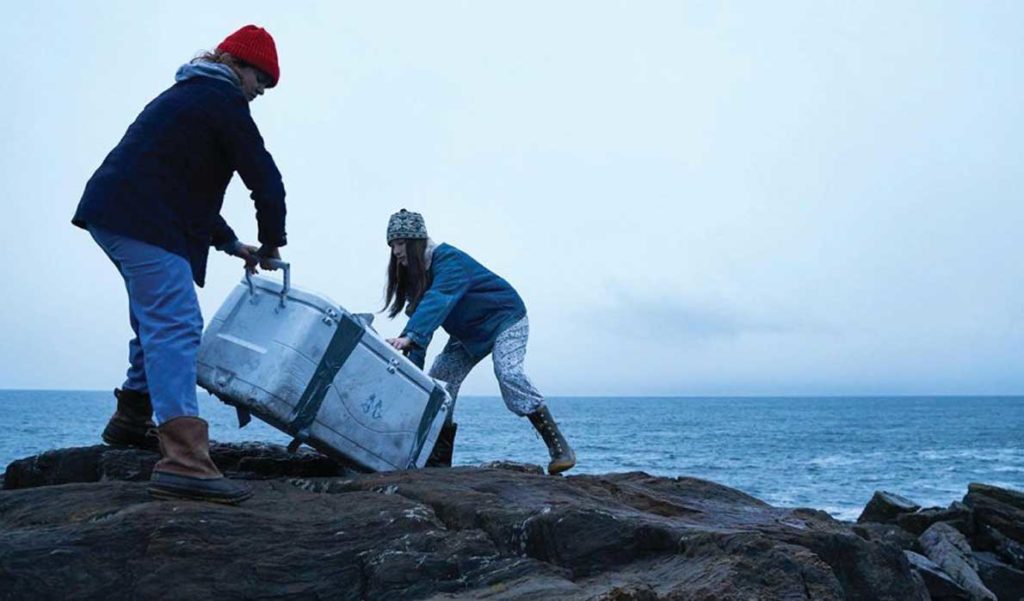By Jacqueline Weaver
Movie tips in the time of coronavirus are like following crumbs through the forest, each promising some relief from the ennui of waiting for the confinement to end.
Blow the Man Down, a film by directors Bridget Savage Cole and Danielle Krudy, could not have been released at a better time. It is nautically noir, Mainey, multi-layered, and offers a humorous and dark twist to who really controls life in a tiny coastal town; in this case, the fictitious Easter Cove, Maine.
Blow the Man Down was a best screenplay winner at the 2019 Tribeca Film Festival and an Indie Spirit nominee. It was purchased by Amazon and is now available to Amazon Prime customers.
Filmed in Cundy’s Harbor in Harpswell, the story begins with two sisters, Mary Beth (Morgan Saylor) and Priscilla Connolly (Sophie Lowe), who are burying their mother after nursing her through a long illness.
The sisters discover on the day of the funeral that their home is in foreclosure, a situation that is unlikely to be resolved with income from the family’s small fish market. Three local women who become pivotal players in the story assure the young women that they had done the right thing putting their lives in limbo while caring for their mother.
Mary Beth isn’t so sure.
Her plan was to attend the University of Maine and never look back. She goes to a local bar the night of the burial, drinks too much and then is menaced by an unsavory Gorski (Ebon Moss-Bachrach). A harpoon is available on the wharf and the story begins.
There follows a somewhat inept cover-up of Gorski’s untimely end, two more killings and the discovery of $50,000 in cash.
At the heart of the story is the owner of a local brothel masquerading as a bed and breakfast and operated by the formidable Margo Martindale, who plays Enid Devlin, the most frightening character of all.
The film opens with a chorus of fishermen singing the sea shanty for which the film was titled. The writer/directors at first listened to sea shanties as inspirations and then decided to use them to help set the tone. The chorus returns again and again, a foreboding backdrop for what is to follow.
But the story becomes even more interesting with the involvement of the three local women played by veteran actors June Squibb, Annette O’Toole, and Marceline Hugot. They prove to be every bit as determined and sly as the brothel owner. And they portray a simple truth that is evident in many small towns: the locals will often circle the wagons to protect their own.
Cole and Krudy met while shooting shorts and making music videos on Coney Island and then crossed paths again while working on sketch comedy videos in Los Angeles.
“We met behind the camera,” Krudy said in an interview with Variety magazine.
Cole added, “It was so rare to meet another girl doing camera stuff.”
Coastal Maine was not a foreign land for them. Cole grew up in Beverly, Mass., waitressed in neighboring Gloucester, and at one point, worked a year in Bar Harbor. Krudy’s mother was born in Maine and then grew up in Groton Long Point, Conn., where Krudy observed the tight ties among the locals in nearby Mystic, Conn.
The two spent eight years working on the script and spent 25 days shooting the film in Harpswell. They advertised for extras on Facebook to draw local residents. Cole and Krudy also braved two nor’easters while filming. Cinematographer Todd Banhazi skillfully portrays the bleak, beautiful, cold and isolated area.
Cole and Kundry said in an interview with the Boston Globe that the strong female figures were modeled on family.
“It’s a larger-than-life plot, but we think of it as a personal story,” said Cole. “It’s really inspired by our female relatives, how they actually talk and how they interact.”
She said the coastal Maine setting was perfect for the film’s irreverent take.
“I think people from New England are just generally funnier than people from elsewhere,” Cole said. “You know, it’s part of the pastime, which is being sarcastic and poking fun at each other. Everybody has this great comedic timing. There’s something in the water.”
“We liked to call it salty humor,” Krudy said.





